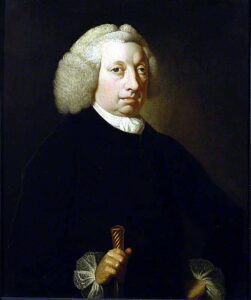
To be remembered for almost 300 years after practicing medicine in an English provincial town is no mean feat. This is particularly so considering that John Huxham made no significant advances in medicine other than describing the epidemics affecting his hometown and for supposedly introducing the term “influenza” into the English language.1-3
Huxham seems to have believed in all the heroic treatments of his time: bleeding and purging, cathartics, emetics, diuretics, “saponaceous medicines and deobstrugents.” He applied all these in vain to his forty-year-old year dropsical wife, the woman whose wealth had initially helped set him up in practice in Plymouth. She died after two attempts of giving her some degree of relief by tapping, which only resulted in bringing forth a “large flux of whitish, purulent, stinking humor.1
Initial progress in setting up practice in Plymouth was slow. The local people were just as happy trusting an old apothecary rather than a young newcomer to town. To promote himself, Huxham would affect an awkward gait and unnatural gravity, though at night he would laugh about it with his friends. He wore a scarlet coat when most physicians dressed in black. He carried a gold-headed cane and was followed by a footman who carried his gloves. He wore riding boots even when he had no place to ride to, and would enter through one gate and come out through another even though he had no patients to visit. As a dissenter he rarely went to church, but when he did, he arranged for a servant to call him for supposed emergencies.1-3
Not being allowed as a dissenter to go to Oxford or Cambridge, he studied medicine at Leiden under the great Boerhaave, then finished up at the less expensive University of Rheims. He was born in a small town in Devon, where his father, a butcher, saved money to pay for his son’s medical education, which in those days consisted largely of studying the Greek and Roman classics.
After a few years in Plymouth, Huxham’s fortune began to smile on him, especially after one of the apothecaries had “madness break out on him.”1 His practice eventually boomed; he became wealthy, and envious contemporaries wrote about him as “proud, selfish, ungrateful, having neither honesty nor virtue to make himself esteemed or respected.”1-3
The origins of Huxham’s medical writings stem from a request by the secretary of the Royal Society to its members to keep a daily record of their observations of the weather (temperature, wind, etc.) and submit their findings yearly to the society for collation and analysis. Adding to this, Huxham began in 1537 to record the various epidemics occurring in Plymouth. He wrote “An Essay on Fevers” (1750) and “A Dissertation on the Malignant, Ulcerous Sore-Throat” (1757)—one of the earliest and best descriptions of diphtheria.
He also wrote on smallpox and on what appears to have been typhus. He gave an accurate description of lead poisoning in Devon in subjects exposed to cider contaminated with lead in mills where apples were being ground. He described the outbreaks of scurvy among seamen going on long voyages. He was particularly impressed by the dietary reforms of Captain James Lind who provided sailors with a daily ration of cider besides lemon, oranges, and beer. He may have preferred cider because he owned apple orchards in the vicinity of town.
In his works he also mentioned isolated clinical cases of interest. His writings were translated into French, German, Italian, and Portuguese, and they were so helpful to the physicians treating the Queen of Portugal that, when she recovered, the king ordered his book to be translated into Portuguese and presented him with a splendidly bound copy.
Huxham is also credited for inventing a tincture of quinine that remained in the pharmacopeia for many years.1 He conducted experiments in physics and chemistry, and received many awards, including an honorary degree from the University of Oxford.
In 1733 Huxham described an epidemic of influenza with its classical symptoms and usual improvement after several days. Ten years later, he was quoted in a London magazine as having said that this illness seemed to be the same as what occurred all over Europe, where it was called the “influenza.” This appears to be the origin of the statement often found in modern literature that John Huxham introduced the term influenza into the English language.1
References
- John Huxham. Medical History 1981;25:415. Published online by Cambridge University Press, August 16, 2012.
- J Ruhräh. John Huxham 1692-1768. J Dis Children 1931;41(3):676.
- Schupbach W. The fame and notoriety of Dr. John Huxham. Medical History, 1981;25:415. Published online by Cambridge University Press, August 16, 2012.

Leave a Reply